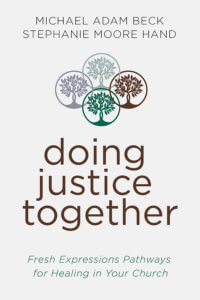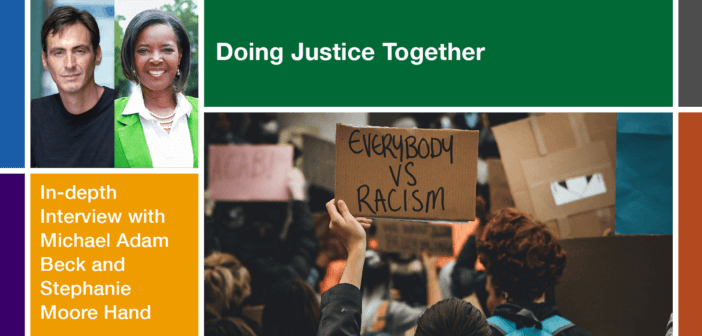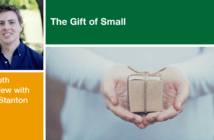How can a faith community organize itself to combat the sin of racism? In this interview, Michael Adam Beck and Stephanie Moore Hand share a practical framework from their book Doing Justice Together that reimagines discipleship, leadership, and evangelism as tools for change.
Watch the interview video on YouTube, listen to this interview, or continue reading.
Ann Michel: I think in many churches, racial justice is seen as one on a menu of different social issues and is often relegated to a racial justice team or a committee. Your book suggests a much more comprehensive and holistic approach to activating a church against racism. But before we get into the specifics of that model, I wanted to ask each of you about the experiences that led you to write this book.
Stephanie Moore Hand: For me, it started years ago when I was a student athlete in Morehead City, North Carolina, where for the first time in my life I experienced injustice on a basketball court. A group of adults, not a child, but a group of adults in a rural county began calling me out by name, calling me “monkey,” and calling me the “n-word” in a basketball game. At the conclusion of the game, they followed me and my team out to the bus and began rocking the bus back and forth, throwing rocks at the bus, and calling for me to be dragged off the bus. We got away safely. But the trauma of that experience as a 17-year-old youth was suppressed in my subconscious. I never talked about it before writing this book. But in writing the book, I began to ask, “What do I do? How can I be a part of the solution?”
A seed was planted in my spirit when the Florida Conference invited me to be a consultant in the hard work they were doing to counter the sin of racism. Through that journey, I saw what can happen when leaders acknowledge the sin and are willing to heal from the sin. It’s also how I met my friend Michael Adam Beck. At the conclusion of a Fresh Expressions event, I was in a prayer line. I was not his prayer line, but I believe in the power of the Holy Spirit intersecting with people’s lives. The person directing the lines pushed me over into his line, and we had a Holy Spirit encounter as he prayed over me at the altar. It was from that encounter that he circled back to me and said, “Hey, let’s consider writing a book together.”
Ann Michel: Michael, is that also the origin of this for you? Or did you have prior experience in working with congregations on the issue of racism?
Michael Adam Beck: My journey includes my own ongoing sanctification as a white male through awareness and repentance for my participation in the racist culture, systems, and thoughts that are part of our society. I did not grow up in a normal situation. I was born addicted and experienced poverty as a kid of the 1980s crack epidemic. I was in and out of juvenile detention. But my deepest experiences of racism have been in the church.
I was sent to pastor a congregation in Wildwood, Florida, a sundown town with a long legacy of racism and segregation. The congregation was very rooted in that soil. As I visited with the chronologically mature saints of that church, I would hear them use the “n-word” at the same as they’re telling me their faith journey with Jesus. People in that congregation, long-term church members, called my biracial granddaughters “half-breeds” and used scripture to say we shouldn’t be “mixing the species,” and things like that. So, I became really passionate about the work of countering racism. We brought Stephanie to Florida to guide us in anti-racism work within congregations and as a conference. She and I got connected in that work and then the Spirit moment she described brought us together to write the book.
Ann Michel: Your book offers a practical, four-part framework for addressing racialization. The first of the four pathways is anti-racist discipleship, which involves a much broader and more robust understanding of the nature of discipleship than is common in our churches today. Michael, could you describe the discipleship component of your model?
Michael Adam Beck: The situation I just described in Wildwood, where people can go to church their whole lives and never have to confront their own racism — that is a failure of discipleship, right? In the book, we play with the mission statement of the United Methodist Church, which is “to make disciples of Jesus Christ for the transformation of the world.” Beautiful mission statement, right? It traces back to Matthew 28:18-20, The Great Commission. But the United Methodist Church has made a “great omission” by leaving out one of the words Jesus actually spoke. It’s the word “go.” If you omit the “go,” all the arrows point back to us. Come to our building. Come to our church. Come to our programs on our time, in a way that we’ve decided, in a language that we’ve chosen, with music we’ve decided before you get there.
Jesus was never about being a host or the disciples building a building and saying, “Hey, come to us.” It was all about go out. Find the person of peace. Go out two by two. It was about being a guest and finding those organic relationships and doing life with the people they were sent to. So, we’re trying to recover some of that. But also, how are we forming people to see their ongoing sanctification journey as healing from racism? How are we confronting those racist ideas and systems with the scriptures? We call Jesus the anti-racist Messiah. While race is not a biblical concept, scripture does tell us that God will bring together the tribes and the ethnicity and the diversity. Stephanie talks so powerfully about being the answer to Jesus’s prayer and becoming the new creation here and now. So, these are some of the features of anti-racist discipleship. It’s discipleship focused not internally, such as come to a Bible study, but lived out in the world.
Ann Michel: If I’m reading your book correctly, there is also a piece of it that’s about learning and formation, or reformation and transformation. How does that connect with the “go” part of it?
Michael Adam Beck: Part of this can require an unlearning process — unlearning stereotypes and assumptions — and then building relationships with people where we do life. So, I would not want to deploy people who have not done that internal work. The diversity of God is all around our churches, but usually just outside our walls. As Dr. King said, “The church hour is still the most segregated hour.” So, how do we prepare people for the diversity that’s in the world? How can we join into that and be an incarnational presence in our communities?
Stephanie Moore Hand: Former Bishop Dr. Peter Story in South Africa said to me in one of my journeys to South Africa, “Until the church is working with the poor outside the walls of the church, the church is doomed to hell.” He said, “The church is in waiting when it’s inside the walls, doing Bible study, having worship, having meetings, formulating mission projects, and so forth. The church doesn’t truly become God’s church until they go outside of the walls and encounter the mosaic of all God’s people.” But they can’t do that until they actually study scripture, worship together, and wrestle inside the church so they are equipped to go out and meet people they would never imagine encountering. Through the power of the Holy Spirit and that type of leadership, transformation can happen.
Ann Michel: The second component of your model is shared leadership. What does this look like in practice specifically in relation to your work of doing justice together, and why is it so important?
Stephanie Moore Hand: If we examined the DNA of most multicultural, multi-ethnic faith communities today, the majority of them are headed by Anglo men. Often, a black or a brown church has merged into a majority white church, but all the leadership on the stage is Anglo. That’s not a great model of “being” church. You have a multifaceted people, but there is not shared leadership. If you examine the United Methodist Church, which is about 89% Anglo, and you examine its leadership, you can conclude that there is not really shared leadership in all spaces and places. The majority is on the Anglo tilt. So, if what you see on stage, what you see in the upper echelons of the United Methodist Church, does not mirror what American society looks like, then we have much work to do. That’s not shared leadership. Shared leadership makes room around the table. Shared leadership ensures that there are co-pastors leading multicultural churches. It might be a brown woman and a black or white man, or whatever. This is one of the most challenging things to do. But the work we did in the Florida conference and work that other annual conferences are doing shows that it is doable. When those in the upper echelons are willing to give up a seat, or simply make the table longer and add seats to it, that’s going to change the trajectory of the church and make the church even more relevant in society.
Ann Michel: The next component of your model is “justice-oriented expressions.” At the risk of oversimplifying this, it seems to involve reconnecting the outward movements of the church — evangelism and church planting — with social justice. Michael, what does that look like in practice, and why is it important?
Michael Adam Beck: Here we drew a lot of wisdom from our friends in Latin America in a movement called the Base Ecclesial Communities. Leonardo Boff is one of the key theological writers about this. He wrote a book called Ecclesiogenesis. In that context, due to a clergy shortage, expressions of church form under lay leadership in every nook and cranny of life. Intrinsic to the life of those communities is a movement towards creating justice and wholeness, particularly around poverty and systemic issues of the wealth gap.
We see a deep resonance with that and what we call Fresh Expressions. The Fresh Expressions movement came out of the UK originally, but it’s a global movement now. It’s grounded in Jesus going into the synagogue in Nazareth in Luke 4, and saying “The spirit of the Lord is upon me…” He reads Isaiah’s social justice litany. He says, “He has anointed me to proclaim good news to the poor and release the captives.” Then, Jesus goes about doing those things. Healing the sick, liberating the oppressed, and proclaiming good news. As he does that, a community of disciples springs up around him that we call the church. So, one of the gifts of liberation theology is to start there. You do that and Christian community springs up from that activity.
In the Fresh Expressions movement, we follow a process: loving, listening, loving and serving, building relationships, exploring discipleship out in the world in those relationships. What does it look like practically? We brought two congregations together to start a Fresh Expression called “Connect” where we do a breakfast church, sharing leadership, and creating a community together that’s out in the world. We found a lot of tension happening, and while we were trying to bring the congregations together to worship together, there were cultural differences. So, we started what’s called an Open Table Fresh Expression, or a dinner church. Rather than people being oriented to the front and hearing a sermon and music, we sat around tables together. We did Jesus stories and sermonic conversation. We asked questions where people had to really get to know each other. That created a situation where we had to deal with our “isms.” We had to work with people’s stereotypes. We had a very diverse group sitting around tables together and doing that work. Over time, the congregation itself was transformed. Real depth of relationships started to form, and we started to heal from a decades-long legacy of racism and segregation in that community. So that would be a practical, justice-oriented expression. Intrinsic to its motivation is joining the diversity of God that’s already in the community, and to build relationships around that.
Ann Michel: So, the fourth part of this model is “reorganizing structures.” Again, at the risk of oversimplification, I think it’s about becoming a change agent to combat structures that perpetuate racism both in the church and in society. What does it mean to become an effective change agent against racism today, Stephanie?
Stephanie Moore Hand: So, I think we already have the model. The question is, do we live it? Revelation 7:9 tells us that there will be a day when every tongue, tribe, nation, and people worship together. Not maybe. There will be. Then, the Lord’s Prayer gives us the vision of “on earth as it is in heaven.” That’s the framework. The question becomes, do we have the courage to go into those spaces and places where people don’t look like us, don’t have our social economics, don’t smell like us, etc.? But we are already equipped. The word has already been passed. The question is, will the church rise up to do it? Just like when the George Floyd incident happened. I’m not minimizing, it because it was horrific, but these things have been going on for over 400 years.
Sometimes as church people we think we have all the answers, but our job is to go into the community to learn what the greatest needs are, to build relationships, and to build trust. Churches in my district form a group called Pass the Peace where we had a partnership with the Charlotte Mecklenburg Police Department. We were intentional in going to black, brown, and white faith communities, not just Methodist, but a multiplicity of folk. We said, “We need to at least begin having conversations.” We’re not talking about solutions. We’re going to simply talk to each other so that we can begin this trust walk, one to another, over food. Jesus always had food in tense situations. He loved a fish fry. So, we would have conversation over food during the day. [Over time], it grew. We intentionally brought into the conversation youth, young adults, and seasoned adults, all arrayed around a table. It takes that type of intentional work to get to the root of the problem. To uproot the sinful nature of our society so that we can truly live now — not tomorrow — but now as people worshiping together and praising God together so that we have a better, stronger world: a stronger society. Because at the end of the day, this ain’t our home. We’re all trying to get to eternity. So, we have to do the work now so that we can see a different world. The church. Not the government, not the business leaders, but those of us who say we profess Jesus Christ through the power of the Holy Spirit, we are truly the change agents because we have the changer inside of us.
Ann Michel: I understand there are some other available resources that congregations can draw on.
Michael Adam Beck: Yes. There’s an e-book companion that comes along with the book. There are sermon series and book studies that can help congregations have hard conversations and get exposure to these ideas starting in that discipleship space. There’s a video series on Amplify Media, with people giving testimony about how they’ve experienced racism and healing racialization through the pathway. Then, if a congregation’s ready for this, or if your district or conference needs a guide to help you along, that is work that Stephanie and I feel very much feel called to. We’d love to come and walk alongside you in that through coaching and cohorts.
Stephanie Moore Hand: I would say the book is a beginning. But we have to continuously do the hard work for examining ourselves to ask if we are going deeper in our faith. Like the old song says, “The wheel goes higher and higher.” Are we going higher and higher in Christ? Are we maturing in our faith? That takes a journey. So, we’ve put resources together to actually journey with annual conferences and districts so that people can rediscover God and grow deeper in their faith so that they can be transformative agents in our world for the sake of Jesus Christ.
 Michael Adam Beck and Stephanie Moore Hand are authors of Doing Justice Together: Fresh Expressions Pathways for Healing Your Church (Abingdon Press, 2024). The book is available through Cokesbury or Amazon.
Michael Adam Beck and Stephanie Moore Hand are authors of Doing Justice Together: Fresh Expressions Pathways for Healing Your Church (Abingdon Press, 2024). The book is available through Cokesbury or Amazon.
The Doing Justice Together: Background and Context e-book designed to support and document the ideas and practices found in the print book is available as a free, downloadable PDF.
Related Resources
- 10 Ways to Make Your Church More Inclusive by Brandan Robertson
- What Would Martin Luther King Jr. Say to the Church Today? by Anthony Hunt
- Honest Talk about Race and Racism featuring Michael R. Fisher Jr. — Leading Ideas Talks podcast episode | Podcast transcript







